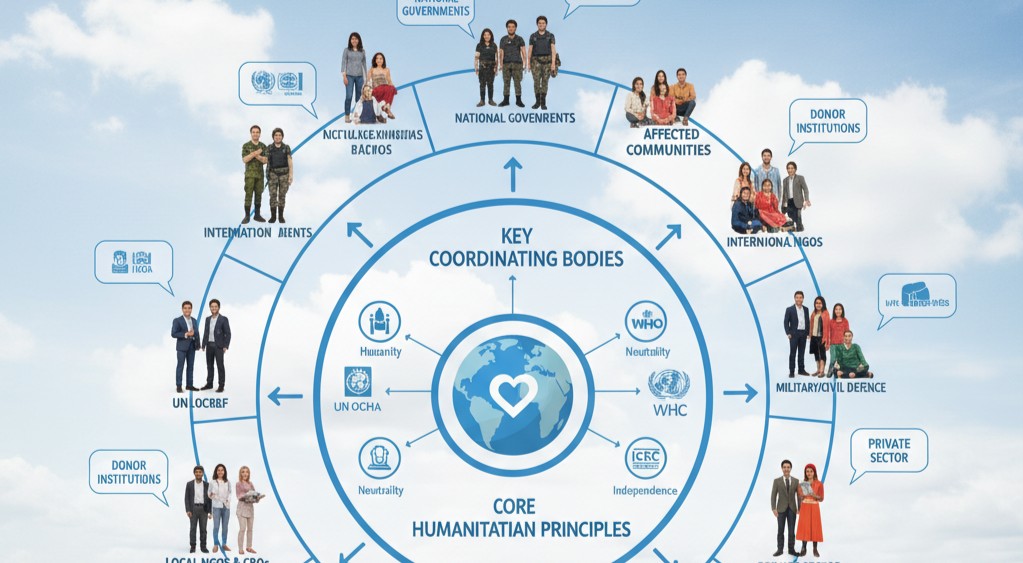
This comprehensive 5-day training course is designed to provide professionals with a deep understanding of the humanitarian system and the key actors who operate within it. Navigating this complex and often-fragmented ecosystem is crucial for anyone involved in crisis response. This course provides a practical, hands-on approach to mastering the system's structure, principles, and coordination mechanisms, ensuring that participants can work effectively and collaboratively to deliver aid in a timely and principled manner.
Throughout the training, we will cover a range of topics crucial for effective humanitarian work. You will learn about the different types of actors, from UN agencies to local NGOs, and how they interact. The course also focuses on the international legal and ethical frameworks that govern humanitarian action, the various funding mechanisms, and the importance of accountability to affected populations. By the end of this course, you will be able to confidently navigate the humanitarian landscape, ensuring your work is coordinated and impactful.
Who Should Attend the Training
Objectives of the Training
Personal benefits
Organizational benefits
Training methodology
Trainer Experience
Our trainers are seasoned professionals with extensive experience in humanitarian response and international development. They have a strong background in both theory and field operations, bringing a wealth of real-world knowledge and practical insights to the classroom. Their expertise is grounded in both humanitarian law and on-the-ground experience, ensuring a dynamic and highly relevant learning environment.
Quality Statement
We are committed to delivering high-quality training that is both engaging and effective. Our courses are meticulously designed to ensure participants not only grasp the core concepts but also gain practical skills that can be immediately applied in their professional roles. We believe in fostering a supportive and collaborative learning environment where every participant can thrive.
Tailor-made courses
Recognizing that every organization has unique needs, we offer tailor-made training courses. We can customize the content, duration, and methodology of our programs to address your specific challenges and goals. Contact us to discuss how we can create a specialized training solution for your team.
Course Duration: 5 days
Training fee: USD 1300
Module 1: Understanding the Humanitarian System
Module 2: Key Humanitarian Actors and Their Roles
Module 3: International Humanitarian Law and Guiding Principles
Module 4: Coordination Mechanisms and Clusters
Module 5: Funding Mechanisms and Accountability
Module 6: The Humanitarian Program Cycle
Module 7: Cross-Cutting Issues in Humanitarian Action
Module 8: The Humanitarian-Development-Peace Nexus
Module 9: The Role of Local and National Actors
Module 10: Practical Application and Case Study
A comprehensive review of all course modules
Requirements:
Participants should be reasonably proficient in English.
Applicants must live up to Armstrong Global Institute admission criteria.
Terms and Conditions
1. Discounts: Organizations sponsoring Four Participants will have the 5th attend Free
2. What is catered for by the Course Fees: Fees cater for all requirements for the training – Learning materials, Lunches, Teas, Snacks and Certification. All participants will additionally cater for their travel and accommodation expenses, visa application, insurance, and other personal expenses.
3. Certificate Awarded: Participants are awarded Certificates of Participation at the end of the training.
4. The program content shown here is for guidance purposes only. Our continuous course improvement process may lead to changes in topics and course structure.
5. Approval of Course: Our Programs are NITA Approved. Participating organizations can therefore claim reimbursement on fees paid in accordance with NITA Rules.
Booking for Training
Simply send an email to the Training Officer on training@armstrongglobalinstitute.com and we will send you a registration form. We advise you to book early to avoid missing a seat to this training.
Or call us on +254720272325 / +254725012095 / +254724452588
Payment Options
We provide 3 payment options, choose one for your convenience, and kindly make payments at least 5 days before the Training start date to reserve your seat:
1. Groups of 5 People and Above – Cheque Payments to: Armstrong Global Training & Development Center Limited should be paid in advance, 5 days to the training.
2. Invoice: We can send a bill directly to you or your company.
3. Deposit directly into Bank Account (Account details provided upon request)
Cancellation Policy
1. Payment for all courses includes a registration fee, which is non-refundable, and equals 15% of the total sum of the course fee.
2. Participants may cancel attendance 14 days or more prior to the training commencement date.
3. No refunds will be made 14 days or less before the training commencement date. However, participants who are unable to attend may opt to attend a similar training course at a later date or send a substitute participant provided the participation criteria have been met.
Tailor Made Courses
This training course can also be customized for your institution upon request for a minimum of 5 participants. You can have it conducted at our Training Centre or at a convenient location. For further inquiries, please contact us on Tel: +254720272325 / +254725012095 / +254724452588 or Email training@armstrongglobalinstitute.com
Accommodation and Airport Transfer
Accommodation and Airport Transfer is arranged upon request and at extra cost. For reservations contact the Training Officer on Email: training@armstrongglobalinstitute.com or on Tel: +254720272325 / +254725012095 / +254724452588
| Course Dates | Venue | Fees | Enroll |
|---|

Armstrong Global Institute
Typically replies in minutes